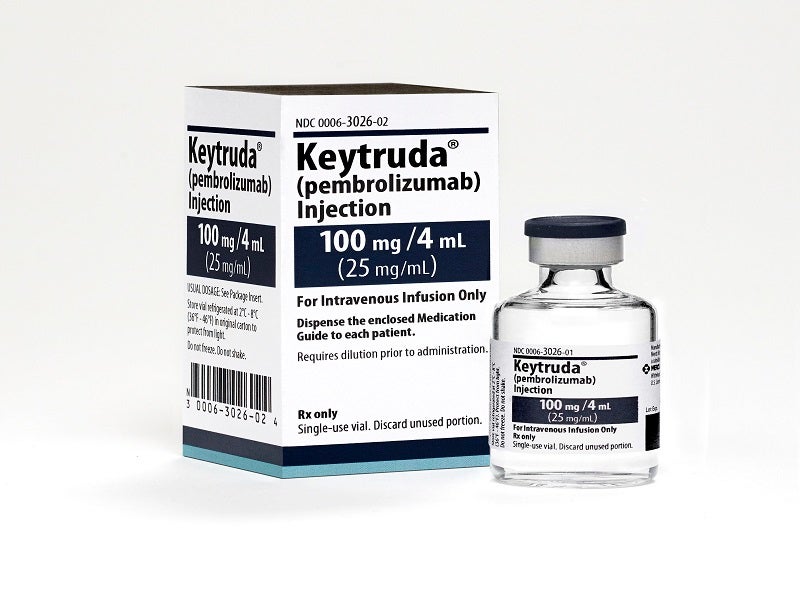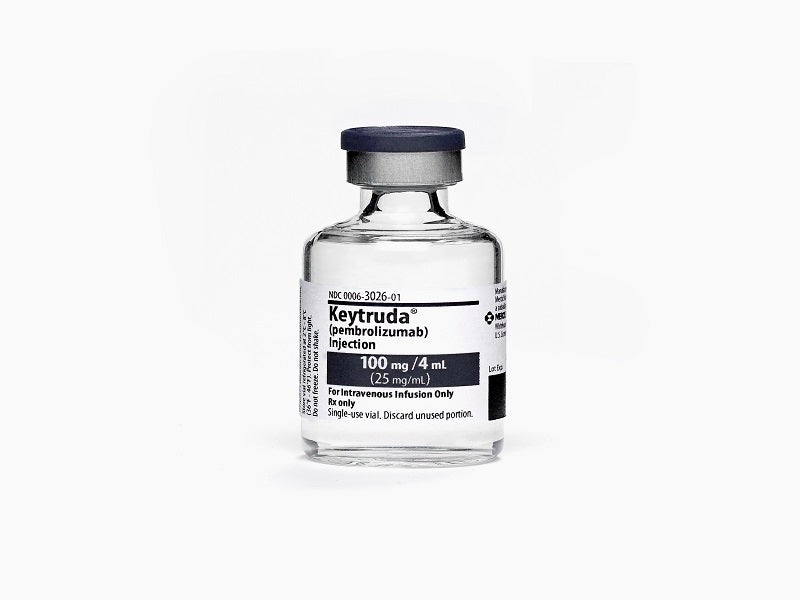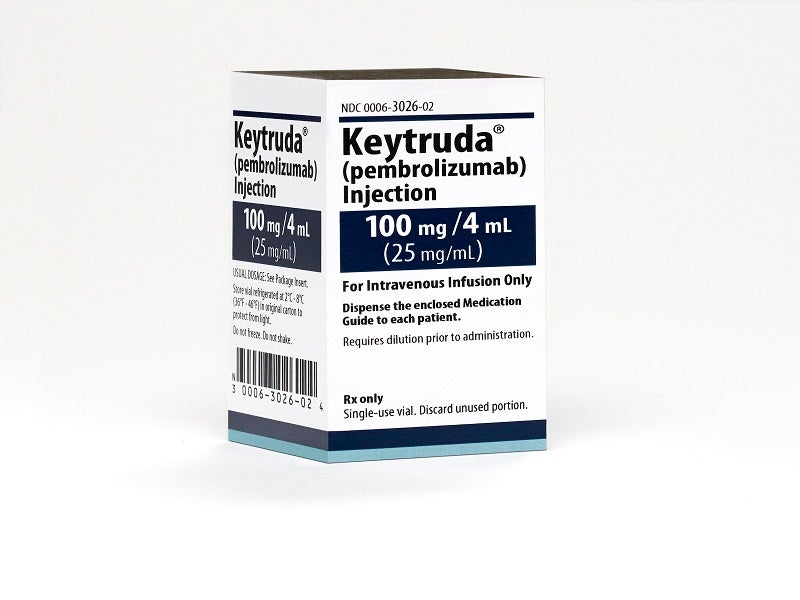Keytruda (pembrolizumab) is an anti-programmed death receptor-1 (PD-1) therapy initially indicated for the treatment of unresectable or metastatic melanoma.
Developed by Merck, the drug is administered intravenously and is available in several dosage strengths based on the indications.
Regulatory approvals for Keytruda
In September 2014, Keytruda received approval from the US Food and Drug Administration (FDA) for the treatment of unresectable or metastatic melanoma and disease progression. The drug was also given breakthrough therapy designation by the FDA.
Keytruda has also received FDA approval for indications including advanced non-small cell lung cancer (NSCLC), hepatocellular carcinoma, microsatellite instability-high (MSI-H) cancer, small cell lung cancer, head and neck squamous cell cancer (HNSCC), classical Hodgkin lymphoma, primary mediastinal large B-cell lymphoma, colorectal cancer, gastric cancer, endometrial carcinoma, tumour mutational burden-high (TMB-H) cancer, cutaneous squamous cell carcinoma and Merkel cell carcinoma.
The European Commission (EC) approved Keytruda for the treatment of advanced NSCLC in January 2017. The drug received approval from the China National Drug Administration (CNDA) for the treatment of advanced melanoma in July 2018.
In January 2019, the Japan Pharmaceuticals and Medical Devices Agency (PMDA) granted five approvals to Keytruda as either a monotherapy or in combination for the treatment of advanced NSCLC, MSI-H and melanoma. In July 2021, Keytruda received FDA approval for high-risk early-stage triple-negative breast cancer (TNBC) in combination with chemotherapy, based on the results of the KEYNOTE-522 clinical trial.
Approval for first-line treatment
In August 2021, Keytruda received approval for treating patients with locally advanced or metastatic urothelial carcinoma who are not eligible for any platinum-containing chemotherapy in the US.
In combination with Lenvima® (lenvatinib), the drug received FDA approval for the first-line treatment of adult patients with advanced renal cell carcinoma (RCC), based on the results of the pivotal phase III KEYNOTE-581 study.
In September 2021, China’s National Medical Products Administration (NMPA) approved Keytruda, together with platinum and fluoropyrimidine-based chemotherapy, for the first-line treatment of patients with advanced oesophageal or gastroesophageal junction (GEJ) carcinoma. The approval was given based on findings from the pivotal phase III KEYNOTE-590 trial.
Keytruda has been authorised for eight indications in five different types of cancer in China.
In October 2021, the FDA approved Keytruda plus chemotherapy, either with or without bevacizumab, for treating patients with persistent, recurrent or metastatic cervical cancer whose tumours express PD-L1 (combined positive score [CPS] greater than or equal to [≥] 1 based on the results of the Phase III KEYNOTE-826 study.
In October 2021, the EC also approved the drug in combination with chemotherapy for the first-line treatment of locally recurrent unresectable or metastatic triple-negative breast cancer (TNBC) in adults.
Based on the results of the KEYNOTE-355 Phase III trial, the approval enables the combination with Keytruda to be marketed in all 27 European Union member states, Iceland, Lichtenstein, Norway and Northern Ireland. The drug is also approved in Canada and Australia.
In November 2021, Keytruda received approval from the FDA as an adjuvant treatment for patients with renal cell carcinoma (RCC) at intermediate-high or high risk of recurrence following nephrectomy, or following nephrectomy and resection of metastatic lesions, based on the results of Phase III KEYNOTE-564 trial.
Objective response rate of 46%
In March 2022, the FDA expanded the Keytruda label for the treatment of patients with advanced endometrial carcinoma that is microsatellite instability-high (MSI-H) or mismatch repair deficient (dMMR). The approval was based on the KEYNOTE-158 clinical trial, in which patients receiving Keytruda showed an objective response rate (ORR) of 46%. The approval marks Keytruda’s fourth gynaecological cancer indication and its second in endometrial cancer.
In January 2023, Keytruda received FDA approval as an additional treatment following surgical resection and platinum-based chemotherapy in adult patients with stage IB (T2a≥4cm), II or IIIA NSCLC based on the results of the Phase III KEYNOTE-091 trial.
In April 2023, Keytruda in combination with Padcev (enfortumab vedotin-ejfv) received FDA approval as the first therapeutic regimen combining an anti-PD-1 and an antibody-drug conjugate for the treatment of adult patients with locally advanced or metastatic urothelial carcinoma (la/mUC) who are not eligible for cisplatin-containing chemotherapy. The approval was based on data from the KEYNOTE-869 trial.
Causes and severity of melanoma
Melanoma is a type of cancer that develops in the pigment-producing cells of the skin, starting as a small, pigmented patch. It can cause moles to become flattened, raised or irregular in shape, as well as forming different coloured spots. In the metastatic stage, the disease spreads to surrounding areas and destroys tissues.
Causes of the disease include overexposure to sunlight, repeated tanning with ultraviolet A (UVA), a family history of melanoma, and the development of other skin cancers.
Around 75,000 new cases of melanoma are recorded in the US each year. Of all diagnosed skin cancers, melanoma causes the highest number of deaths.
Keytruda’s mechanism of action
Keytruda is a humanised monoclonal antibody (mAb) that boosts the body’s immune system and improves its ability to fight melanoma-causing tumours.
The drug prevents the interaction between PD-1 and its ligands, including PD-L1 and PD-L2.
Clinical trials of Keytruda
The FDA’s approval of Keytruda was based on results from a Phase Ib clinical trial named the KEYNOTE-001 study, an open-label, multi-centred, randomised, dose-comparative study that enrolled 411 patients with unresectable or metastatic melanoma whose disease had progressed.
The study enrolled patients who were treated with two or more doses of ipilimumab at 3mg/kg or higher alongside a BRAF or MEK inhibitor. It excluded patients with autoimmune diseases or a history of adverse reactions to ipilimumab. The average age of participants was 61 years.
Patients were randomised to receive either 2mg/kg or 10mg/kg of Keytruda every three weeks. The dose was continued until disease progression or toxicity was noticed.
The study’s primary endpoint was the confirmed overall response rate (ORR), while secondary endpoints included progression-free survival (PFS), overall survival (OS) and duration of response.
Tumour response in advanced melanoma was evaluated with response evaluation criteria in solid tumours using blinded independent central review and duration of response. The drug’s performance was observed by assessing the tumour’s status every 12 weeks.
The most common adverse reactions found in patients on Keytruda included fatigue, cough, nausea, pruritus, rash, decreased appetite, arthralgia, constipation and diarrhoea.
Preliminary results from the study demonstrated that in 89 patients who received 2mg/kg of Keytruda, the overall response rate (ORR) was 24% and the response duration ranged between 1.4 and 8.5 months.
Keytruda’s approval for NSCLC was based on the results of a Phase III clinical trial KEYNOTE-189, which demonstrated significant improvement in the OS and PFS of the patients receiving Keytruda than those on placebo.
The drug’s approval for hepatocellular carcinoma was based on the positive outcomes of the Phase II clinical study KEYNOTE-224. ORR was the primary endpoint of the study.
The FDA approved Keytruda for gastric cancer treatment based on results from the Phase II clinical study KEYNOTE-059.





